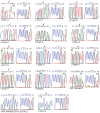TP53 Pro72 allele is enriched in oral tongue cancer and frequently mutated in esophageal cancer in India
- PMID: 25436609
- PMCID: PMC4250174
- DOI: 10.1371/journal.pone.0114002
TP53 Pro72 allele is enriched in oral tongue cancer and frequently mutated in esophageal cancer in India
Abstract
Purpose: The tumor suppressor p53 is known to be inactivated frequently in various cancers. In addition, germline polymorphisms in TP53 are known to affect protein function and influence risk of developing different types of cancers. In this study, we analyzed the association of TP53 Pro72Arg polymorphism with squamous cell carcinoma of oral tongue (SCCOT) and esophagus (ESCC) in India.
Methods: We assessed the distribution of TP53 Pro72Arg polymorphism in one hundred and fifteen and eighty two SCCOT and ESCC patients, respectively, with respect to one hundred and ten healthy controls from the same population. In addition, we analyzed association of the polymorphism with several clinico-pathological and molecular parameters.
Results: Pro72 allele was significantly enriched in SCCOT patients compared to the healthy control group but neither allele was enriched in ESCC. Interestingly, Pro72 allele was preferentially mutated in ESCC which was confirmed by analysis of samples heterozygous for Pro72Arg.
Conclusions: Our study revealed the association of Pro72 allele with SCCOT suggesting the effect of this polymorphism on SCCOT risk. Preferential mutation of Pro72 allele exclusively in ESCC indicates the need for further studies to understand the tissue specific effect of p53 polymorphism.
Conflict of interest statement
Figures


Similar articles
-
High prevalence of p53 gene alterations and protein overexpression in human esophageal cancer: correlation with dietary risk factors in India.Clin Cancer Res. 1997 Nov;3(11):2129-36. Clin Cancer Res. 1997. PMID: 9815606
-
An Old Story Retold: Loss of G1 Control Defines A Distinct Genomic Subtype of Esophageal Squamous Cell Carcinoma.Genomics Proteomics Bioinformatics. 2015 Aug;13(4):258-70. doi: 10.1016/j.gpb.2015.06.003. Epub 2015 Sep 16. Genomics Proteomics Bioinformatics. 2015. PMID: 26386145 Free PMC article.
-
Association of TP53 intron 3, 16 bp duplication polymorphism with esophageal and gastric cancer susceptibility in Kashmir Valley.Oncol Res. 2011;19(3-4):165-9. doi: 10.3727/096504011x12935427587920. Oncol Res. 2011. PMID: 21473292
-
Gene mutations and polymorphisms of TP53 and FHIT in chronic esophagitis and esophageal carcinoma.Anticancer Res. 2011 May;31(5):1685-90. Anticancer Res. 2011. PMID: 21617227
-
Recent Advances From Basic and Clinical Studies of Esophageal Squamous Cell Carcinoma.Gastroenterology. 2015 Dec;149(7):1700-15. doi: 10.1053/j.gastro.2015.08.054. Epub 2015 Sep 12. Gastroenterology. 2015. PMID: 26376349 Review.
Cited by
-
Candidate SNP Markers Significantly Altering the Affinity of the TATA-Binding Protein for the Promoters of Human Genes Associated with Primary Open-Angle Glaucoma.Int J Mol Sci. 2024 Nov 28;25(23):12802. doi: 10.3390/ijms252312802. Int J Mol Sci. 2024. PMID: 39684516 Free PMC article.
-
Effect of TP53 rs1042522 on the susceptibility of patients to oral squamous cell carcinoma and oral leukoplakia: a meta-analysis.BMC Oral Health. 2018 Aug 20;18(1):143. doi: 10.1186/s12903-018-0603-6. BMC Oral Health. 2018. PMID: 30126398 Free PMC article.
-
Meta-Analysis Results on the Association Between TP53 Codon 72 Polymorphism With the Susceptibility to Oral Cancer.Front Physiol. 2018 Aug 2;9:1014. doi: 10.3389/fphys.2018.01014. eCollection 2018. Front Physiol. 2018. PMID: 30116199 Free PMC article.
-
A review of the most promising biomarkers for early diagnosis and prognosis prediction of tongue squamous cell carcinoma.Br J Cancer. 2018 Sep;119(6):724-736. doi: 10.1038/s41416-018-0233-4. Epub 2018 Aug 21. Br J Cancer. 2018. PMID: 30131545 Free PMC article. Review.
References
-
- Rethman MP, Carpenter W, Cohen EE, Epstein J, Evans CA, et al. (2010) Evidence-based clinical recommendations regarding screening for oral squamous cell carcinomas. J Am Dent Assoc 141:509–520. - PubMed
-
- Moore SR, Johnson NW, Pierce AM, Wilson DF (2000) The epidemiology of tongue cancer: a review of global incidence. Oral Dis 6:75–84. - PubMed
-
- Myers JN, Elkins T, Roberts D, Byers RM (2000) Squamous cell carcinoma of the tongue in young adults: increasing incidence and factors that predict treatment outcomes. Otolaryngol Head Neck Surg 122:44–51. - PubMed
-
- Bello IO, Soini Y, Salo T (2010) Prognostic evaluation of oral tongue cancer: means, markers and perspectives (I). Oral Oncol 46:630–635. - PubMed
-
- Zini A, Czerninski R, Sgan-Cohen HD (2010) Oral cancer over four decades: epidemiology, trends, histology, and survival by anatomical sites. J Oral Pathol Med 39:299–305. - PubMed
Publication types
MeSH terms
Substances
LinkOut - more resources
Full Text Sources
Other Literature Sources
Medical
Research Materials
Miscellaneous

